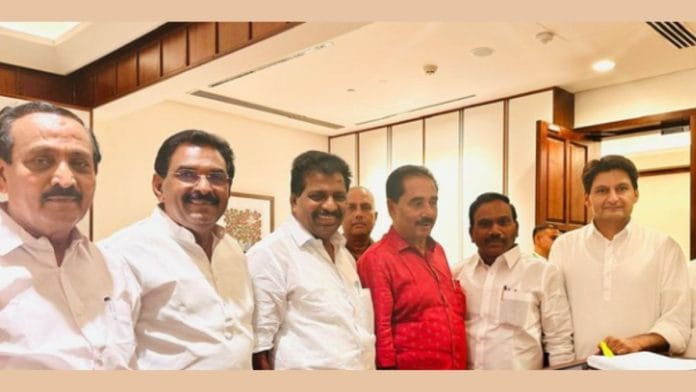New Delhi: The Opposition Tuesday appeared ready to force an election to the Lok Sabha Speaker’s post — the fourth in India’s independent history — fielding Congress MP Kodikunnil Suresh as its nominee against the National Democratic Alliance’s (NDA) Om Birla, who also held the post in the 17th Lok Sabha.
This came shortly after Congress leader Rahul Gandhi told reporters that party president Mallikarjun Kharge and Defence Minister Rajnath Singh had spoken about the Speaker’s post. Kharge told Singh that there could be a consensus only if the government returned the favour by giving the Deputy Speaker’s post to the Opposition following the parliamentary “convention”.
Singh and Parliamentary Affairs Minister Kiren Rijiju have been reaching out to the Opposition benches to develop a consensus on the Speaker’s post, for which elections have been held thrice before in independent India, in 1952, 1967 and 1976.
In 1952, G.V. Mavalankar of the Congress became the Speaker, defeating Shankar Shantaram More of the Peasants and Workers Party of India. Mavalankar won comfortably owing to the Congress’s majority in the Lok Sabha.
In 1967, Neelam Sanjeeva Reddy of the Congress was, in the fourth Lok Sabha, pitted against Tenneti Viswanathan, whose candidature was supported by Atal Bihari Vajpayee, an MP at the time. Reddy was elected as Speaker, with 278 votes, while Viswanathan got 207.
In 1976, the Congress’ Baliram Bhagat defeated the Jana Sangh’s (later BJP) Jagannathrao Joshi.
The Deputy Speaker, by convention, has been an Opposition face.
In the 17th Lok Sabha, however, there was no Deputy Speaker. Also, in the 16th Lok Sabha, or Narendra Modi’s first term as prime minister, the post was held by M. Thambidurai of the All India Anna Dravida Munnetra Kazhagam (AIADMK), which was not a part of either the NDA or the United Progressive Alliance (UPA) then, leading to a consensus around his name.
On Tuesday, Gandhi said that the government had in a way “insulted” Kharge by walking back on its assurance that Singh would return a call to the Congress president on the Opposition’s demand for the Deputy Speaker’s post. Gandhi said this also showed that Modi was merely paying lip service by speaking about the need for constructive cooperation.
“Kharge ji received a call from Rajnath Singh, who sought support for the Speaker’s post. Going by convention, the Deputy Speaker should be from the Opposition. Rajnath ji told Kharge ji last evening that he will call back but that has not happened yet,” said Gandhi.
He added: “Narendra Modi talks about constructive cooperation and goes on to insult our leader. His intent is not clean, and he doesn’t want any constructive cooperation either. The entire Opposition made it clear that if convention is followed, then we will extend full support to the government’s Speaker candidate.”
The Congress MP from Rae Bareli pointed out that the Deputy Speaker’s post was with the NDA during the UPA years between 2004 and 2014. In UPA-1, Charanjit Singh Atwal of the Shiromani Akali Dal (SAD) held the post, while in UPA 2, the BJP’s Kariya Munda was the Deputy Speaker in the Lok Sabha.
“Narendra Modi says something and does something else. That is his formula, his strategy, and he will have to change this approach. The PM’s words do not carry any value. Outside the House, he talks about cooperation, but does the reverse inside,” Gandhi said, speaking to reporters outside the Parliament.
According to the Rules of Procedure and Conduct of Business in Lok Sabha, the Deputy Speaker presides over the House in the absence of the Speaker.
“The Deputy Speaker or any other member competent to preside over a sitting of the House under the Constitution or these rules shall, when so presiding, have the same powers as the Speaker when so presiding and all references to the Speaker in these rules shall in these circumstances be deemed to be references to any such person so presiding,” according to the rule book.
(Edited by Rohan Manoj)
Also read: Modi fell prey to ‘too much greed’, BJP lost wherever Ram ji went on padyatra — Puri Shankaracharya






